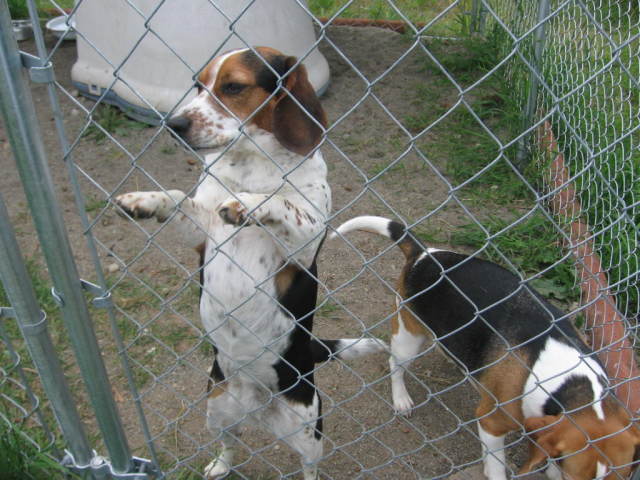QuestionHi Dawn,
Thank you so much for your response. The vet told us that she "didn't hold him down very hard" to administer the IV catheter, so he was obviously held down. And he has been given IV's in the past (probably 6 months or so ago was the most recent), when he got anesthesia to have his teeth cleaned.
Can you tell me a little more about blood clots, how they form, and what happens when an animal is held down? When he was at home, he would sometimes go into defense/protection mode when people got too close to our 8-month old son, or he would go crazy over the possibility of a tasty morsel of food, so his heart rate would go from 0 to 60 in no time flat on a regular basis. So we're confused about why excitement did not cause any problems, but distress obviously did.
We have so many questions, but here are just a few more we would like to get your input on. Are blood clots common in small, older dogs with kidney trouble? Where do they typically reside, and are they time bombs that could go off at any moment, even when the dog is not in distress? Or are they formed and thrown in the moment of distress? Would you consider an IV on an older dog a risky procedure given what it may take to actually administer the IV, and would you forewarn your clients of the potential risks?
We're really struggling with this, because he seemed so healthy when we took him there last Monday, and we feel in our heart that he would still be here today and for many months (and maybe years) to come, if we didn't take him to the vet last week for this "risk free" and "routine" procedure.
Robin
-------------------------
Followup To
Question -
Hi Dawn,
We brought our 13-year old Yorkie to the vet this morning for "routine" iv to help bring his kidney values down. Our vet told us that his levels were high and that his kidneys have been operating at roughly 25% for quite a while.
According to the vet, there was absolutely no risk in having the iv procedure done. They took some blood and then inserted the iv catheter, but before they even began administering the iv, he made a brief yelping/screaming sound and immediately died. She tried resucitating him for 30 minutes, but to no avail. The vet said that it could have been a heart attack/arrythmia or a blood clot that got thrown and went to the brain.
Although he was getting old and his vision was fading, he seemed healthy, was eating well, and was not drinking excessively. Can you give us some insight into what may have happened here? We don't believe that he would have died this suddenly if he were home, so something at the vet's office facilitated his death. We are not going to have a necropsy done because it won't change the outcome, but we're looking for some closure here and were hoping that you might be able to shed some light on the subject, as we are heartbroken.
Answer -
Hi Robin, Did they have to hold him down for the IV? Had he had an IV before? If they had to hold him down, it could have caused him to have a heart attack. The fact that she tried to resucitate him for 30 minutes to no avail makes me lean more towards a clot breaking loose in the bloodstream and going to the heart. When that happens, no amount of resucitation would have brought him back because the clot is blocking the blood flow to the heart. I hope this helps a little, and I am very sorry for your loss.
Dawn
AnswerHi Robin, Sorry for the delay in getting back to you, things have been real hectic the past couple of days. Blood clots can form anywhere in the body. There is no prediction as to where or when, and they can break loose at anytime. My grandfather passed away at 57 from one breaking loose and going straight to his heart. He died before he hit the ground. He was doing nothing but standing in front of a resturant talking to friends. Yes they are like time bomb as you don't know when and where they are and when they will go off. Thats the biggest problem.
I wouldn't consider an IV a risky procedure for an older dog, the hardest thing for an older dog would be that his veins could collapse when trying to give the IV due to his age. That is always the difficulty when dealing with senior dogs. Of course, clients should be forewarned that the dog may have to be held down, and it can take a couple of attempts to get a vein on a senior dog due to veins possibly collapsing when doing the procedure. I think your vet was trying to reaassure you on the "risk free" talk, but anything involving seniors is not risk free.
It is so hard to say if the procedure had anything to do with a possible blood clot breaking loose or not. It could have happened at home with him doing absolutely nothing. Unfortunately, there really is no way to predict if it would have been better to forego the procedure or not. I wish I could give you better news on it, but really it is one of those things that you really can't second guess.
Dawn

 Hair growth stimulation
Question
Hairless Pom
A few years back I cut my
Hair growth stimulation
Question
Hairless Pom
A few years back I cut my
 AKC
Question
Bailey and Cocoa
Hi Im Ashley Sommer. I am ten
AKC
Question
Bailey and Cocoa
Hi Im Ashley Sommer. I am ten
 Vicious fighting between two females
Question
Alice and Julia
I have two female rescue dogs
Vicious fighting between two females
Question
Alice and Julia
I have two female rescue dogs
 My 1 year old Yorktese is paper trained but goes pee in the middle of the kitchen floor
Question
QUESTION: I have a wonderful 1 year old
My 1 year old Yorktese is paper trained but goes pee in the middle of the kitchen floor
Question
QUESTION: I have a wonderful 1 year old
 puppy behavior
Question
Cooper and Guy
Hi, thanks so much for reading
puppy behavior
Question
Cooper and Guy
Hi, thanks so much for reading